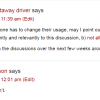For some reason Laurie Penny thought we needed to hear the formulas from her too, in case we hadn’t already heard them enough times from enough other fools and cowards.
What happened to sisterhood?
Good question. What happened to yours?
Last week, beloved children’s author J.K. Rowling became the world’s most famous transphobe.
Second sentence, and already in the ditch. Calling her a “transphobe” assumes what needs to be argued, aka poisons the well. Who says she’s a “transphobe”? On what basis do they say it? Is it true? Is it true even in the terms of people who go along with most of the dogma?
After the Harry Potter writer spent days defending transphobia on Twitter and in her blog, writing that she was “worried about the new trans activism,” millions of distraught fans and confused bystanders were left wondering what the hell was going on.
That’s more frankly just a lie. If I were Rowling I’d be considering sending in that lawyer again. Rowling did not “defend transphobia.”
But Rowling’s public spasm of self-delusion isn’t unusual.
Oh we’re the ones with the self-delusion, are we – we who don’t believe men magically become women by saying “I am a woman” – we’re delusional.That’s persuasive.
Britain is the epicenter of a strange, savage, and specific cultural backlash against trans rights. That backlash is doing real harm to people whose lives should not be up for debate.
What does that mean? If she means “whose right to live should not be up for debate” then of course they shouldn’t, but then no one is arguing that they should, so why say it? If she means “whose claims about their identity which contradicts their physical reality should not be up for debate” then that’s just absurd. It’s a useful trick, putting it ambiguously like that, because it makes people shy of disputing it.
I’d do the rest but…it’s long, and LP is not an interesting writer.


